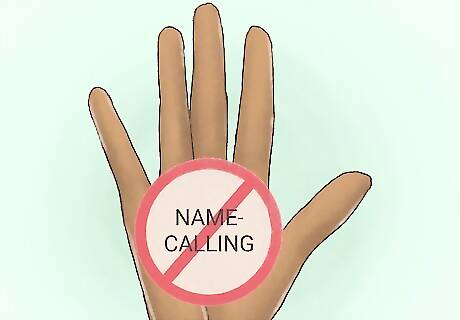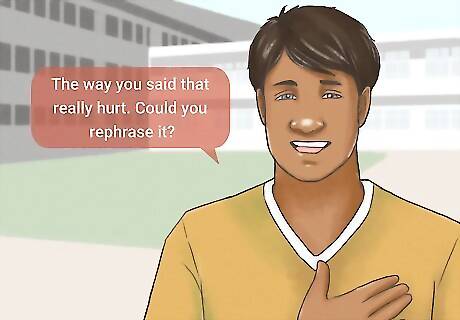
views
Take a deep breath and smile.

Show that you stay calm under pressure to stop someone in their tracks. If a person is trying to get a rise out of you, they’re more likely to give up if you don’t react. A few deep breaths will signal that they might benefit from reflecting instead of reacting. When you give them a friendly expression, you prove that you don’t want to be enemies. You can even say that you just need some time to think about how to reply. "It’s all good. I just need a moment here." "Alright, I just needed to take a breath there. You were saying?" "Can you give me a second? Thanks."
Walk away and distract yourself.

Remove yourself from the situation to say that you don’t want to engage. You’ll also tell the person that you have priorities that are more fun or interesting than arguments. For instance, if you’re in a coffee shop and a stranger thinks you’re taking too long deciding on your drink order, walk away and browse the mugs that are for sale. You’ll save yourself a lot of time by keeping the peace. If someone sends you a rude text, say you’re on break from technology and that you’re going to turn off your phone. If a person makes a rude comment at work, you can tell them you have to go work on an important project. If a relative is giving you a hard time, you can let them know you made plans with your friends and leave.
Make a casual joke.

Lighten the mood to change the tone of the conversation. Just one funny remark can break the tension and even win the person over. Make sure that the comment is upbeat and designed to make the person laugh or at least smile. Maybe a family member is frustrated that you keep buying socks for everyone during the holidays. Tell them you’re a brand ambassador for cozy footwear. Turn every negative observation into an opportunity to be playful. That way, you encourage silliness instead of clashes with people. "I know I take a while to speak up. I’m secretly a time traveler, you know. I could be anywhere! Any era, even!" "Well, jokes aren’t my strong point. Netflix isn’t going to sign me on for a standup special anytime soon!" "Yeah, I do speak kinda loud. I’ve got bionic lungs."
Talk about the big picture.

Point out the issue bothering the person to direct their attention to that. Observe what’s happening around you and a frustrated person, and pinpoint any influences outside your control. Highlight those details to give the rude person a new perspective. If a customer is annoyed that they want a game but it’s out of stock, explain that last month was pre-order season. By talking about systems that you don’t take part in, anyone arguing with you can take a step back and reassess their concern. "Sorry I'm late. I checked all of the traffic reports, but there was an accident. Here’s the news report." "We’re out of ice cream because the whole county is facing a dairy shortage." "I do care. I just can’t come over because my teacher scheduled a ton of finals."
Talk to others nearby.

Keep a friendly attitude with everyone else to set a good example. If you engage with other people and chat with them, you can win some allies. That way, you don’t have to handle an awkward situation alone. You might also inspire any person who’s been giving you a hard time. They’re more likely to realize that you don’t want to create tension and that you just want to connect with others. "I think I see my friends over there! I should go catch up with them." "Hey! Thanks for sticking up for me. I’m just going to let it slide." "How’s it going? Can I just hang out with you for a bit? It was getting kind of heated."
Mention your politeness and kindness.

Speak up about how considerate you are to help them self-reflect. Talk to them with a calm, neutral tone and take a lot of pauses to give them the chance to speak. When it’s your turn to tell your side of the story, tell them that you’ve been patient and respectful during the entire interaction. You give them the chance to compare your courtesy to their own approach. "I’ve been nothing but respectful here. Would you mind returning the favor?" "Hey, I’m not blaming anyone. Can we not point fingers?" "I’ve listened to you for a while. Is it okay if I speak now?"
Express your boundaries.

Tell them what treatment you’ll accept so they can speak respectfully. Remain optimistic by focusing on what you will respond to. For instance, if you need them to call you by your name instead of any other term, say that. You can also talk about your ideal conversation. Mention you prefer to speak in a soft tone or that you need another person in the room to moderate the dynamic. Define what you feel is best for you so they can adapt to your needs. "I really need courteous language here. I can’t stand behind name-calling." "I’m a big fan of non-violent communication. I respond best to that style!" "If I’m going to continue this conversation, I need someone else to step in."
Describe what you feel at the moment.

Open up about your emotions and encourage them to be sensitive. Show your bravery by confessing that you’re hurt or sad. Shift focus from an argument to how a comment landed for you. Look the person in their eyes and calmly explain your state of mind. Whether they’re a stranger or someone you’ve known for a long time, you remind them that their words and actions have power. They may soften and reconsider their behavior. "The way you said that really hurt. Could you rephrase it?" "I’m disappointed by that remark. I’m just brainstorming for our project." "I’m really bothered by how you put that. I’m just trying out a new style and wanted to express my creative side."
Say you only accept positive comments.

Share words you'll actually take personally to block out rude comments. Explain that you’ll absorb messages that feel like they apply to you and ignore any other words. If you value your intelligence and someone uses an adjective that doesn’t line up with how you see yourself, shrug and say they must not know you very well. By deciding what you’ll take seriously, you show healthy confidence. "Yeah, that doesn’t sound like me. I’m actually really outgoing." "I’ll overlook that! That doesn’t describe me at all. Then again, we just met!" "That’s not a word choice I would use. Neither would my friends!"
Check in about their day.

Ask about their recent experiences so they see you as supportive. Lend a listening ear, because that might be just what they need. Maybe no one stopped to notice what they were struggling with. If you skip over an intense topic and invite a person to vent about a bunch of frustrations unrelated to you, they’re more likely to appreciate you and identify what actually bothers them. "Hey, have you had a rough morning? We’ve all been there." "Are you okay? You sound really frustrated." "How’s your day been going so far? It kind of seems like you’ve got a lot going on."
Thank them for speaking up.

Compliment their directness to improve their self-esteem. Focus on what you agree with, even if you might have described a situation differently or with a softer tone. In cases where you don’t see eye to eye, admire their willingness to talk about what matters to them. They might cool down and want to share more thoughts. "I agree with a lot of what you said. I do think that the prices could be cheaper." "You don’t think pizzerias shouldn’t have salad bars? I’m sure a lot of other people agree! Maybe you can open your own restaurant?" "You’re making a lot of solid points about local policies. I bet you’d make a big impact at our town hall."
Solve the problem with them.

Offer to help out so they can join forces with you. Ask them what steps you can take to resolve an issue. Collaborate with them to find the root of their frustration. Any conflict is an opportunity to create a team dynamic with family members, co-workers, and even strangers. When you cooperate with others, they’ll want to chat about solutions. "Yeah, I think the music is really loud in this club, too. I’ll go speak to the DJ." "I know you want to impress everyone at the family reunion, but I think you’re being really critical of me. Why don’t I tell you some of my accomplishments so you can chat about them?" "I know we’ve all got a big deadline to meet here. Why don’t we split up the tasks?"
Focus on what you share in common.

Remind people about similarities or bonds to inspire them to relax. If a stranger is frustrated about a long line, chat about why you’re both there in the first place. Maybe you’re part of a group or organization and people are disagreeing. Bring the discussion back to why you started the club. If you’ve known a family member or a friend for a long time, reflect on old memories and all the years you’ve spent with them. Everyone craves connection, so focus on building or keeping ties! "Yeah, this band is super popular. Of course, it’ll take forever to get in! What’s your favorite song of theirs?" "Let’s all remember we’re in this book club because we love to read! Why don’t we take another vote about this month’s topic?" "Hey, we’ve known each other for, what, ten years? I’m hoping to go for eleven, so why don’t we just call it a truce?"















Comments
0 comment